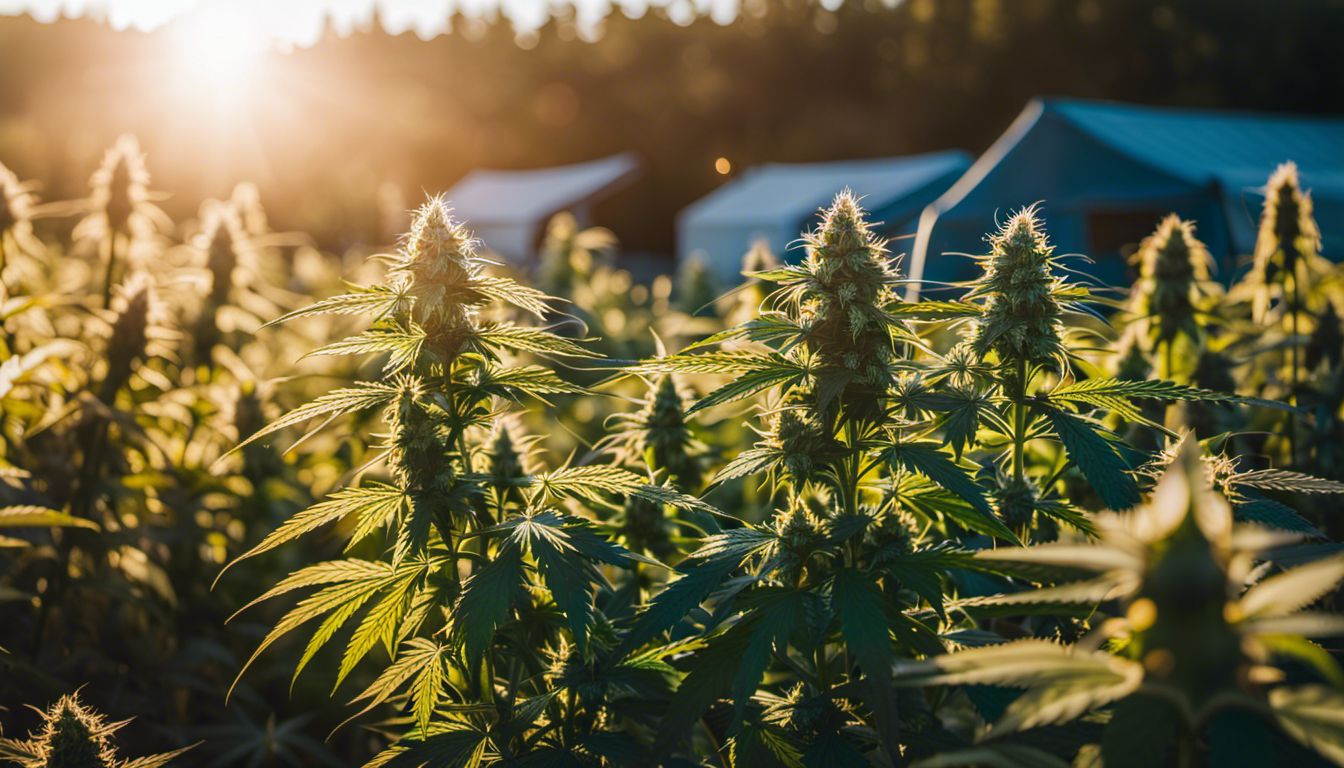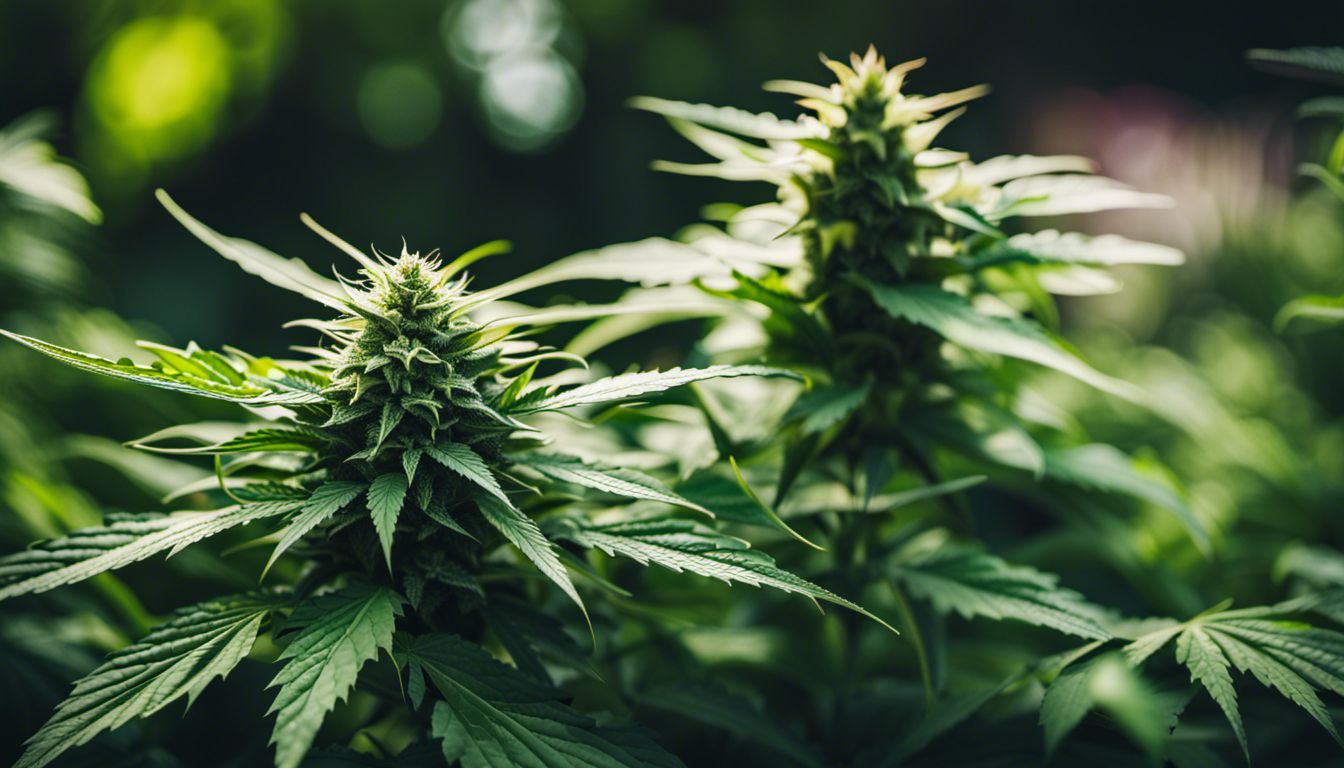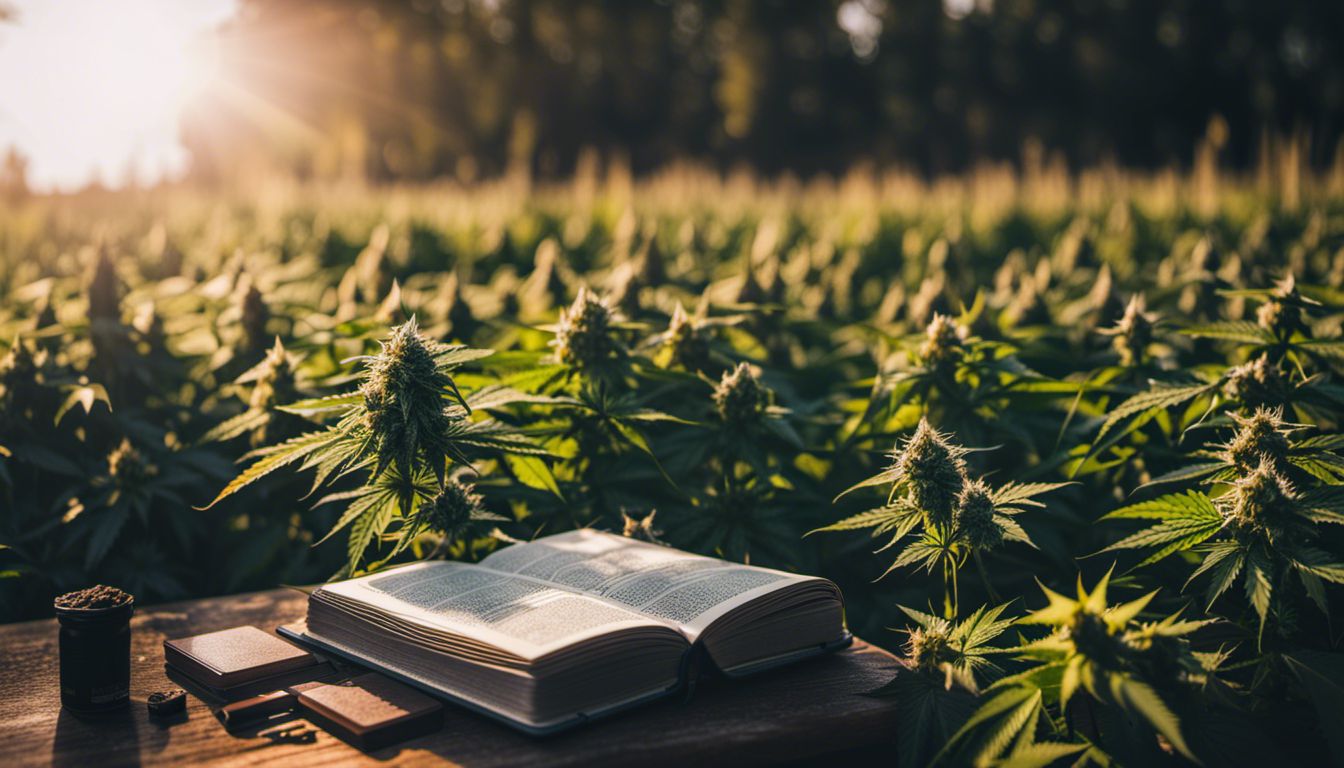Navigating the varying degrees of marijuana legality in the United States can be a confusing task. Despite being classified as an illicit substance at the federal level, many states have given the green light for the recreational and medicinal use of cannabis.
This article provides you with comprehensive insights into locations within the U.S. where marijuana is legal to both possess and consume, giving you clarity on this complex issue. So let’s dive in to decode these laws together!
Key Takeaways
- Several states in the United States have legalized recreational marijuana, including Colorado, Washington, Alaska, Oregon, California, Maine, Massachusetts, Michigan and Vermont.
- Twenty – eight states, along with Puerto Rico and Guam, have legalized medicinal marijuana.
- Federal laws classify marijuana as illegal at the national level but there are ongoing discussions and actions that indicate a potential shift towards more leniency.
Understanding Marijuana Legalization
Marijuana legalization refers to the process of legalizing the recreational or medicinal use of cannabis, allowing individuals to possess, consume, and in some cases, cultivate marijuana without facing legal consequences.
Definition of Marijuana Legalization
Marijuana legalization refers to the process of removing all legal prohibitions against it. This includes allowing for its sale, possession, use, and cultivation by adults. It’s important to note that various restrictions may still apply, like age limits and driving-under-the-influence laws similar to alcohol regulations.
Legalization also involves regulating the production and distribution of marijuana – ensuring a safe and secure supply chain from seed to sale. Many states began this process with medical marijuana before expanding it further to include recreational use as well, marking an evolving shift in societal attitudes towards cannabis use over time.
Difference between legalization and decriminalization
Legalization and decriminalization of marijuana are distinct approaches to cannabis laws. In the context of legalization, states like Colorado, California, and Washington have fully permitted and regulated the recreational use of cannabis.
It means that residents in these areas can grow, sell, purchase, and possess marijuana without fear of criminal prosecution. On the other hand, decriminalization refers to reducing legal penalties for minor cannabis offenses like possession of small amounts up to a certain limit.
Under this system, individuals caught with a specified amount aren’t criminally charged but may be subjected to fines or mandatory drug education programs similar to a traffic violation; it’s akin to treating marijuana infractions as civil rather than criminal cases.
Despite both being strides towards leniency in marijuana policies compared to outright prohibition enforcement, there’s still a notable difference between full-blown legalization and mere decriminalization.
Where Is Marijuana Legal?
State | Recreational | Medical | Cultivation |
Illegal; Misdemeanor on first offense, felony on subsequent offenses | Legal to possess up to 70 daily dosages at one time | Illegal | |
Legal to possess up to 1 oz | Legal to possess up to 1 oz | Legal for medical & recreational use up 6 plants per person, or 12 plants in a household | |
Legal to possess up to 1 oz | Legal to possess up to 2.5 oz per 14 days | Legal for medical & recreational use up to 6 plants per person, or 12 plants in a household | |
Illegal; Misdemeanor | Legal | Illegal | |
Legal to possess up to 1 oz | Legal to possess up to 8 oz | Legal for recreational use up to 6 plants per household | |
Legal to possess up to 2 oz | Legal to possess up to 2 oz | Legal for medical & recreational use up to 6 plants per person (3 mature at the same time) | |
Legal to carry up to 1.5 oz or possess up to 5 oz locked inside a home or trunk of a vehicle | Legal to possess up to 5 oz per month | Legal for medical & recreational use up to 6 plants per person (3 mature at the same time) | |
Legal to possess up to 1 oz & 12 g of concentrate | Legal to possess up to 6 oz | Illegal | |
Illegal | Legal to possess up to three 70-day, or six 35-day supply limits | Illegal; Felony | |
Illegal; decriminalized in certain cities | CBD oil (less than 5% THC) | Legal only for medical patients up to 7 plants per person | |
Illegal; Decriminalized up to .1 oz | Legal to possess up to 4 oz. | Illegal; Felony | |
Illegal; Misdemeanor (85 g or less) | CBD oil (less than 0.1% THC) | Legal only for medical patients up to 5 plants per person | |
Legal to possess up to 30 g | Legal to possess up to 2.5 oz per 14 day period | Illegal | |
Illegal; Misdemeanor (up to 6 months in jail, $1000 fine) | CBD oil (less than 0.3% THC) legal for any use | Illegal; Felony | |
Illegal; Misdemeanor | Legal to possess up to an amount of THC not exceeding 4.5 grams per 90 day period | Illegal | |
Illegal; Misdemeanor | CBD oil (containing 0% THC) legal for any use | Illegal; Misdemeanor (5 plants or less) | |
Illegal; Misdemeanor (8 oz or less) | Legal to possess a 30-day supply | Illegal | |
Illegal; Decriminalized up to 14 grams | Legal to possess up to a 30-day supply | Legal for medical & recreational use up to 6 plants per person (3 mature at the same time) | |
Legal to possess up to 2.5 oz | Legal to possess up to 2.5 oz | Legal for recreational use up to 2 plants per household. Registered medical cannabis patients can grow 4 plants per household | |
Legal to possess up to 1.5 oz & 12 g of concentrate | Legal to possess up to 120 g or 36 g of concentrate | Legal for medical & recreational use up to 6 plants per person, or 12 plants in a household | |
Legal to possess up to 1 oz in public or 10 oz at home | Legal to possess up to 10 oz per every 2-month period | Legal for recreational use up to 12 plants per household | |
Legal to possess up to 2.5 oz in public or 10 oz at home | Legal to possess up to 2.5 oz | Legal for recreational use up to 8 plants (4 mature at the same time) | |
Legal to possess up to 2 lbs, 8 g of concentrate, & 800 mg of infused edibles | Legal to possess up to 2.5 oz every 14 days | Illegal | |
Illegal; Decriminalized up to 30 g or less for first offense | Legal to possess up to 3 oz per month | Legal for medical & recreational use up to 6 plants per person, or 12 plants in a household | |
Legal to possess up to 3 oz | Legal to possess up to 6 oz per month | Legal for recreational use up to 4 plants per person or 8 plants per household (4 mature at the same time) | |
Legal to possess up to 1 oz & 8 g of concentrates | Legal to possess up to 1 oz | Illegal | |
Illegal; Decriminalized (first offense only) | CBD Oil (containing up to 0.3% THC) | Legal for medical & recreational use only for people at least 25 mi from the nearest dispensary. 6 plants for recreational and 12 plants for medical use | |
Legal to possess up to 2.5 oz & one fourth of an oz of concentrate | Legal to possess up to 2.5 oz | Illegal | |
Illegal; Decriminalized up to 0.75 oz or less | Legal to possess up to 2 oz | Illegal | |
Legal to possess up to 6 oz. | Legal to possess up to 3 oz per month | Legal for medical use up to 16 plants (4 mature at the same time) or 6 mature plants for recreational per person, max 12 per household | |
Legal to possess up to 2 oz | Legal to possess up to 8 oz per 90-day period | Legal for medical & recreational use up 3 mature and 3 immature plants per person, max 12 per household | |
Legal to possess up to 5 lb of cannabis or 24 g of concentrates at home and 3 oz in public | Legal to possess a 60-day supply | Illegal | |
Illegal; Decriminalized up to 42 g or less | CBD oil | Illegal | |
Illegal; Decriminalized up to 14 g or less | Legal to possess up to 3 oz | Illegal | |
Illegal; Decriminalized (civil infraction) | Legal to possess a 90-day supply | Legal only for medical patients up to 6 plants & 6 seedlings per person | |
Illegal | Legal to possess up to 8 oz, 1 oz of concentrate, and 72 oz of edibles in a residence | Legal for medical use up to six plants & 18 seedlings for medical patients or 4 plants per household for recreational use | |
Legal to possess up to 2 oz in public or 8 oz at home | Legal to possess up to 24 oz | Illegal | |
Illegal; Decriminalized In Philadelphia and Pittsburgh up to 30 g | Legal to possess up to a 90-day supply | Legal for medical use up to 12 plants & 12 seedlings for patients or 6 plants (3 mature at the same time) for recreational use | |
Legal to possess up to 1 oz | Legal to possess up to 2.5 oz | Illegal | |
Misdemeanor | Cannabis oil (less than 0.9% THC) | Legal for medical patients up to 3 plants; more in some cases | |
Misdemeanor | Legal to possess up to 3 oz | Illegal; Misdemeanor (9 plants or less), Felony (10 or more plants) | |
Illegal; Misdemeanor (less than .5 oz; first or second offense only) | Cannabis oil (less than 0.9% THC) | Illegal | |
Illegal (Austin police won’t arrest for less than 4 oz; Houston, Dallas, San Antonio, Austin, Travis County have a “cite and release” policy) | CBD oil (no more than 1% THC and no less than 10% CBD) | Illegal | |
Illegal; Misdemeanor | Legal to possess up to 4 oz per 30-day period | Legal for medical use up to 9 plants (2 mature at the same time) or 6 plants for recreational use (2 mature at the same time) | |
Legal to possess up to 1 oz | Legal to possess up to 2 oz | Legal for medical & recreational use up to 4 plants per household | |
Legal to possess up to 1 oz in public; no limit applies at home. | Legal to possess up to 4 oz per 30-day periodegal. | Legal for medical patients only up to 6 plants. | |
Legal to possess up to 1 oz | Legal to possess up to 3 oz, 48 oz of edibles, 21 g of concentrate, & 216 oz of infused-liquids | Illegal | |
Illegal; Misdemeanor | Legal | Illegal; Felony | |
Illegal; Misdemeanor on first offense, felony on subsequent offenses | CBD oil | Illegal | |
Illegal; Misdemeanor | CBD oil | Illegal |
States that have Legalized Recreational Marijuana

Several states in the United States have legalized recreational marijuana, including Colorado, Washington, Alaska, Oregon, California, Maine, Massachusetts, Michigan, Vermont.
Colorado
Colorado made history by becoming one of the first states to legalize recreational marijuana in 2012. This bold decision created room for a flourishing industry, filled with an array of cannabis strains and products.
In this state, you can find not only dried cannabis flowers but also edibles and concentrates at local dispensaries. Colorado’s planned approach towards its marijuana market has generated millions in sales tax revenue.
Despite opposition citing public health and safety risks, supporters maintain that cannabis is less dangerous than alcohol while offering therapeutic benefits. Rules vary regarding possession limits, home cultivation, and taxation aspects on marijuana sales within Colorado’s borders as they have begun to carve their own path amidst ongoing national debate regarding legalization.
Washington
Washington is one of the 24 states in the US that have legalized recreational marijuana. They passed Initiative 502 in 2012, allowing for the recreational use of marijuana. This means that adults aged 21 and older can legally possess and consume cannabis without facing criminal charges.
Washington was one of the first states to take this step towards legalization, along with Colorado.
Alaska
Alaska is one of the 23 states that have legalized recreational marijuana. It followed in the footsteps of Colorado and Washington, becoming one of the early adopters of this change.
Alongside these 23 states, Washington, D.C., and Guam also allow for recreational marijuana use. The state’s House passed a decriminalization bill for marijuana in April 2022. Moreover, President Joe Biden has announced plans to issue pardons for those convicted of simple marijuana possession at the federal level in Alaska in 2022.
Oregon
Oregon is one of the 23 states that have legalized recreational marijuana. Along with Washington, D.C. and Guam, Oregon joined Colorado and Washington in leading the way for legalization back in 2012.
Currently, state legislatures in Oregon are grappling with the issue of legalizing marijuana and how to address its disproportionate impact on minority communities.
California
California, the golden state, has played a pioneering role in marijuana legislation. It was the first state to legalize medical marijuana way back in 1996. Today, recreational marijuana is also legal in California.
This means that individuals can possess up to 1 ounce of usable marijuana and grow up to 6 plants. California has its own set of regulations when it comes to possession limits, home cultivation, and taxation of recreational marijuana sales.
And interestingly, President Joe Biden supports leaving regulation of recreational marijuana up to individual states like California.
Maine
Maine is one of the 23 states where recreational marijuana is legal. In Maine, individuals can possess up to 2.5 ounces of usable marijuana and grow a maximum of 15 plants, with no more than 3 being mature plants.
Additionally, individuals in Maine are allowed to possess up to 5 grams of hash or concentrates. The legalization of marijuana in Maine aims to address issues such as the disproportionate impact of marijuana laws on minority communities and mass incarceration.
Massachusetts
Massachusetts is among the 23 states that have legalized recreational marijuana. This happened after Colorado and Washington became the first states to do so in 2012. In Massachusetts, steps have been taken to address the consequences of marijuana prohibition, including expungement of low-level convictions.
It’s important to note that President Joe Biden announced plans to issue pardons for individuals convicted of simple marijuana possession at the federal level in 2022. Furthermore, under President Barack Obama’s direction, the Justice Department was instructed to defer to state authorities in jurisdictions that had legalized marijuana.
Michigan
Michigan is one of the 23 states that have legalized recreational marijuana. This means that adults aged 21 and older can legally possess and consume marijuana for personal use.
The legalization of recreational marijuana in Michigan reflects a larger trend among states embracing similar laws. It offers opportunities for cannabis cultivation and use within the state while also contributing to the overall growth of the legal cannabis industry.
Vermont
Vermont is one of the 23 states that have legalized recreational marijuana. It joined Colorado and Washington as the first states to do so. Vermont has also legalized the use of cannabis products for medical purposes.
Currently, the state legislature is grappling with the issue of marijuana legalization, which shows that there are ongoing discussions and debates about this topic in Vermont. In 2022, President Joe Biden announced his intention to issue pardons for individuals convicted of simple marijuana possession at the federal level, potentially benefiting those in Vermont who have been affected by such convictions.
Other notable states
The list above is only a selection of states where marijuana is legal. Check the full list in the table above for a full overview of the legal status of weed in all US states.
With a growing number of states embracing legalization, the landscape of cannabis cultivation and use continues to evolve across the United States.
States that have Legalized Medicinal Marijuana

28 states, along with Puerto Rico and Guam, have legalized medicinal marijuana. These states recognize the potential medical benefits of marijuana and have implemented laws to allow its use for certain medical conditions. Here is the list of states where medicinal marijuana is legal:
- Alaska
- Arizona
- Arkansas
- California
- Colorado
- Connecticut
- Delaware
- Florida
- Hawaii
- Illinois
- Louisiana
- Maine
- Maryland
- Massachusetts
- Michigan
- Minnesota
- Missouri
- Montana
- Nevada
- New Hampshire
- New Jersey
- New Mexico
- New York
- North Dakota
- Ohio
- Oklahoma
- Oregon
- Pennsylvania
- Rhode Island
Federal Laws on Marijuana

The Cole Memorandum
The Cole Memorandum, issued in 2013 by the U.S. Department of Justice during the Obama administration, provided guidance to federal prosecutors on enforcing marijuana laws in states where it is legal.
Its main focus was on preventing marijuana distribution to minors, stopping revenue from criminal enterprises, and preventing violence and firearm use in marijuana cultivation and distribution.
The memorandum allowed states to regulate marijuana within their borders as long as they followed specific guidelines. However, in 2018, then-Attorney General Jeff Sessions rescinded the memorandum, creating uncertainty for states with legalized marijuana.
Current status of marijuana at the federal level
The current status of marijuana at the federal level is complex. While some progress has been made in terms of decriminalization and legalization efforts, marijuana remains illegal under federal law.
However, there have been recent developments that indicate a shifting perspective. For example, President Joe Biden announced plans to issue pardons for individuals convicted of simple marijuana possession, signaling a potential shift towards more leniency.
In addition, the House passed a bill to decriminalize marijuana in April 2022, and the Senate is currently considering the Cannabis Administration and Opportunity Act. These ongoing discussions and actions show that attitudes toward marijuana at the federal level are evolving.
Public Opinion on Marijuana Legalization
The public opinion on marijuana legalization is overwhelmingly in favor of it. In fact, 91% of Americans believe that cannabis should be legalized to some extent. This support has even reached mainstream politicians, with many Democrats and even some Republicans backing the idea.
The current US President, Joe Biden, supports leaving the regulation of recreational marijuana up to individual states. These sentiments are reflected in state legislatures as well, where lawmakers are grappling with the question of whether and how to legalize the drug.
As a result, several marijuana-related bills have been introduced in Congress, including a recent decriminalization bill passed by the House in April 2022 and an ongoing consideration of the Cannabis Administration and Opportunity Act by the Senate.
The Future of Marijuana Legalization
The future of marijuana legalization looks promising, with ongoing efforts in Congress to pass legislation and potential future states considering legalizing recreational or medicinal marijuana.
Marijuana legalization efforts in Congress
Congress is currently making efforts to legalize marijuana at the federal level. In April 2022, the House passed a bill that would decriminalize marijuana, and now it’s up to the Senate to consider the Cannabis Administration and Opportunity Act.
This bill aims to regulate cannabis like alcohol, allowing states to decide their own policies while also implementing measures for equity and social justice. Additionally, other marijuana-related bills have been introduced in Congress as legislators grapple with how best to approach legalization.
President Joe Biden has also expressed his support for pardoning individuals convicted of simple marijuana possession at the federal level. The future of marijuana legalization in Congress remains uncertain but promising as lawmakers continue discussions on this topic.
Prospective states for future legalization
Several states are being closely watched for the potential future legalization of marijuana. These states include New York, New Jersey, Connecticut, and Pennsylvania, all of which have made significant progress in recent years toward legalizing recreational cannabis.
Additionally, there is growing support for legalization in states like Delaware, Rhode Island, and Maryland. These states have already decriminalized marijuana or legalized it for medicinal use and may be the next to pursue full legalization.
With public opinion shifting towards acceptance and more states exploring the economic benefits of cannabis legalization, we can expect to see further progress in expanding access to marijuana across the country.
Conclusion
In conclusion, marijuana is legal for recreational use in 23 states, including Colorado, Washington, California, and Massachusetts. Additionally, medical marijuana has been legalized in 40 states and the District of Columbia.
While federal laws still classify marijuana as illegal, the landscape of legalization is changing rapidly as more states embrace its benefits. The future looks promising for continued expansion of marijuana legalization efforts across the United States.
FAQs
Where is marijuana legal in the United States?
Currently, marijuana is legal for recreational use in 19 states and Washington D.C. These include Alaska, Arizona, California, Colorado, Illinois, Maine, Massachusetts, Michigan, Montana, Nevada, New Jersey Oregon, Vermont Virginia, and Washington. Additionally, medical cannabis is legal in an additional 36 states.
Is marijuana legal at the federal level in the United States?
No, marijuana remains classified as a Schedule I controlled substance under federal law which means it is illegal at the federal level regardless of state laws.
Can you legally travel across state lines with marijuana?
Traveling with marijuana between states where it is legal can be complex and subject to various restrictions. It’s important to research and understand the specific laws of both your departure and destination locations before attempting to transport or possess any quantity of marijuana.
What are the penalties for possessing or distributing marijuana illegally?
Penalties for possessing or distributing marijuana illegally vary depending on federal and state laws. They can range from fines to probation to imprisonment depending on the quantity involved and individual circumstances. It’s important to consult local laws or seek legal advice if you have concerns about your specific situation.













